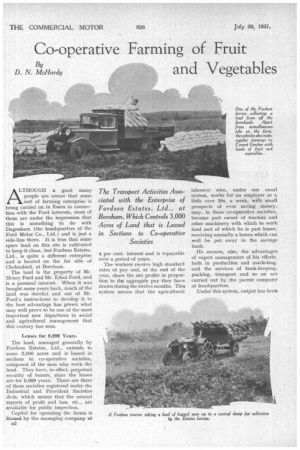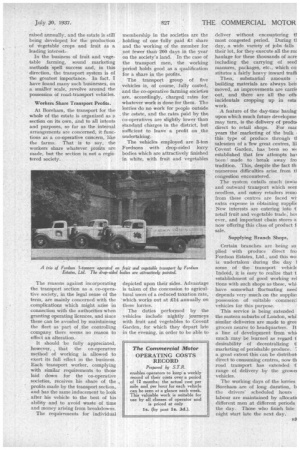Co-operative Farming of Fruit and Vegetables
Page 36

Page 37

If you've noticed an error in this article please click here to report it so we can fix it.
By D. N. Mc/lardy
LTHOUGH a good many people are aware that some sort of farming enterprise is being carried on in Essex in connection with the Ford interests, most of them are under the impression that this is something to do with Dagenham (the headquarters of the Ford Motor Co., Ltd.) and is just a side-line there. It is true that some spare land on this site is cultivated to keep it clean, but Fordson Estates, Ltd., is quite a different enterprise and is located on the far side of Chelmsford, at Boreham.
The land i8 the property of Mr. Henry Ford and Mr. Edsel Ford, and is a personal interest. When it was bought some years. back, much of the land was derelict and out of Mr. Ford's instructions to develop it to the best advantage has grown what may well prove to be one of the most important new departures in social and agricultural management that this century has seen.
Leases for 9,999 Years.
The land, managed generally by Fordson Estates, Ltd., extends to some 3,000 acres and is leased in sections to co-operative societies, composed of the men who work the land. They have, in effect, perpetual security of tenure, since the leases are for 9,999 years. There are three of these societies registered under the Industrial and Provident Societies Acts, which means that the annual reports of profit and loss, etc., are available for public inspection.
Capita] for operating the farms is loaned by the managing company at B2 4 per cent, interest and is repayable over a period of years.
The workers receive high standard rates of pay and, at the end of the year, share the net profits in proportion to tlw aggregate pay they have . drawn during the twelve months. This system means that the agricultural
labourer who, under our usual system, works for an employer at a little over 30s. a week, with small prospects of ever saving money, may, in these co-operative societies, become part owner of tractors and other machinery with which to work land and of which he is part lessee, receiving annually a bonus which can well be put away in the savings bank.
He secures, also, the advantages of expert management of his efforts, both in production and marketing, and the services of book-keeping, packing, transport and so on amo carried out by the parent company at headquarters.
Under this system, output has been raised annually, and the estate is still being developed for the production of vegetable crops and fruit as a leading interest.
In the business of fruit and vegetable farming, sound marketing methods spell success and, in this direction, the transport system is of the greatest importance. In fact, I have found many such businesses, ou a smaller scale, revolve around the possession of road-transport vehicles.
Workers Share Transport Profits.
At 13oreham, the transport for the whole of the estate is organized as a section On its own, and to all intents and purposes, so far as the internal arrangements are concerned, it functions as a co-operative concern, like the farms. That is to say, the workers share whatever profits are made, but the section is not a registered society.
The reasons against incorporating the transport section as a co-operative society, in the legal sense of the term, are mainly concerned with the complications which might arise in connection with the authorities when granting operating licences, and since these can be avoided by maintaining the fleet as part of the controlling company there seems no reason to effect an alteration.
It should be fully appreciated, however„ that the co-operative method of working is allowed to exert its full effect in the business. Each transport worker, complying with similar requirements to those laid down for the co-operative societies, receives his share of the profits made by the transport section, and has the same inducement to look after his vehicle to the best of his ability and to avoid waste of time and money arising from breakdowns.
The requirements for individual membership in the societies are the holding of one fully paid RI share and the working of the member for not•fewer than 200 days in the year on the society's land. In the case of the transport men, the working period holds good as a qualification for a share in the profits.
The transport group of five vehicles is, of course, fully costed. and the co-operative farming societies are, accordingly, charged rates for whatever work is done for them. The lorries do no work for people outside . the estate, and the rates paid by the. co-operatives are slightly lower than standard charges in the district, but sufficient to leave a profit on the undertaking.
. The vehicles employed are 3-ton. Fordsons with drop-sided lorry bodies which are attractively finished in white, with fruit and vegetables depicted upon their sides. Advantage is taken of the concession to agricultural users of a reduced taxation rate, ' which works out at £14 annually on these lorries.
The duties performed by the vehicles include nightly journeys with fruit and vegetables to Covent Garden, for which they depart late in the evening, in order to be able to deliver without encountering tI most congested period. During ti day, a wide variety of jobs falls • their lot, for they execute all the roz haulage for these thousands of acre including the carrying of seed manures, packages, etc., which co: stitutes a fairly heavy inward traffi Then, substantial amounts building materials are always heir moved, as improvements are earth out, and there are all the oth incidentals cropping up in esta work.
A feature of the day-time haulag upon which much future developme may turn, is the delivery of produi direct to retail shops. For mar years the marketing of the bulk this type of produce through tl salesmen of a 'few great centres, lii Covent Garden, has been .so wc established that few attempts hat been made to break away fro tradition. This, despite the fact th numerous difficulties arise, from tl congestion encountered.
The system entails much inwai and outward transport which seen needless, and many retailers remo from these centres are faced wii extra expense in obtaining supplie New interests are entering into f retail fruit and vegetable trade; ho) ever, and important chain stores a now offering this class of product f sale.
Supplying Branch Shops.
Certain branches are being su. plied with produce direct fro Fordson Estates, Ltd., and this rya is undertaken during the day 1 some of the transport vehicle Indeed, it is easy to realize that t establishment of good working rel tions with such shops as these, whi have somewhat fluctuating need depends very much on the suppliei possession of suitable commerci vehicles for this purpose.
This service is being extended the eastern suburbs of London, whi1 similar deliveries are made to grree grocers nearer to headquarters. It a line of development from whi, much may be learned as regard desirability of decentralizing t1 marketing of perishable produce.
a great extent this can be distribut direct to consuming centres, now th road transport has extended f range of delivery by the growei vehicles.
The working days of the lorries Boreham are of long duration, b the drivers' scheduled hours labour are maintained by allocatii different men at different periods the day. Those who finish late night start late the next day:




















































































